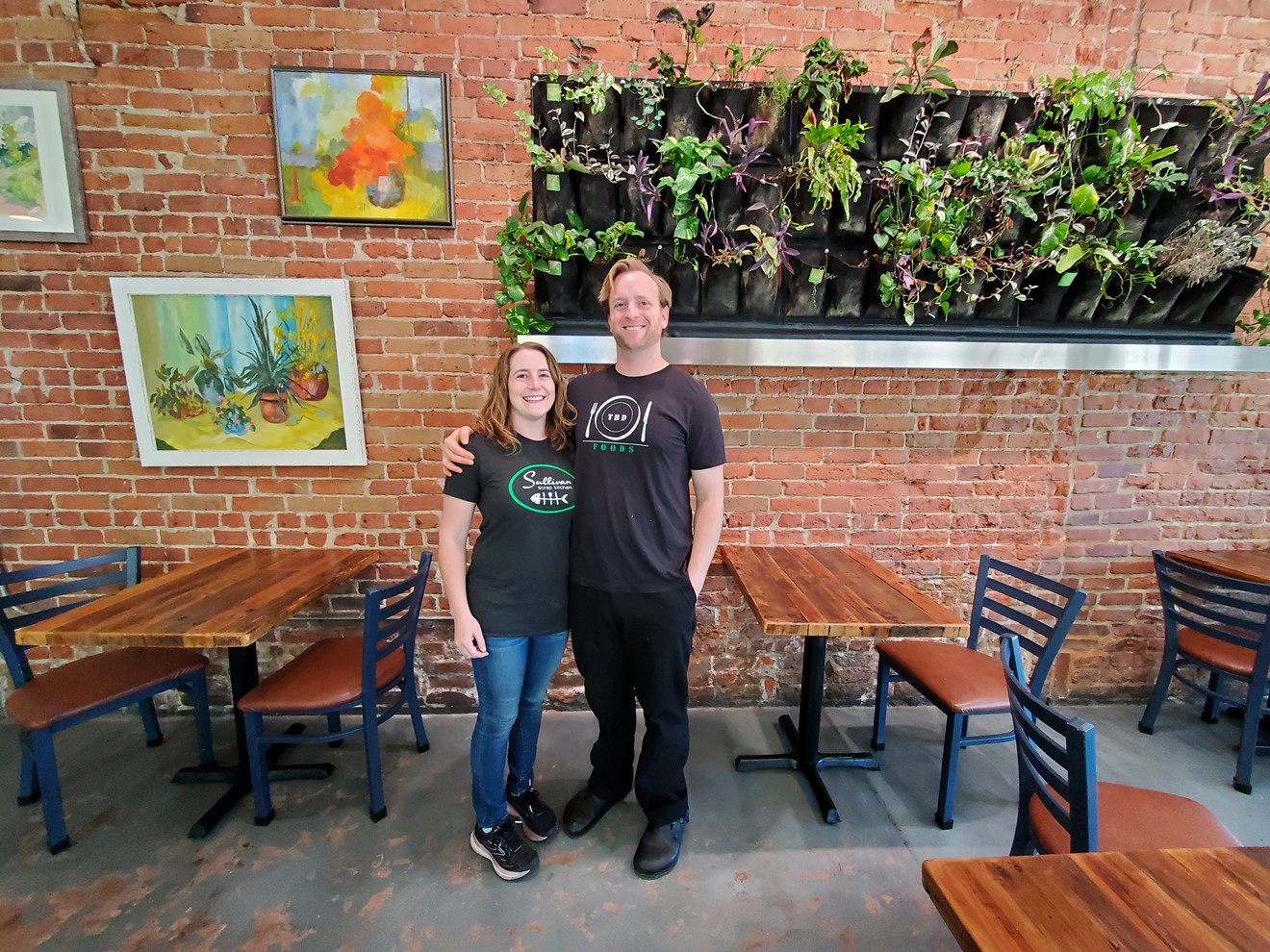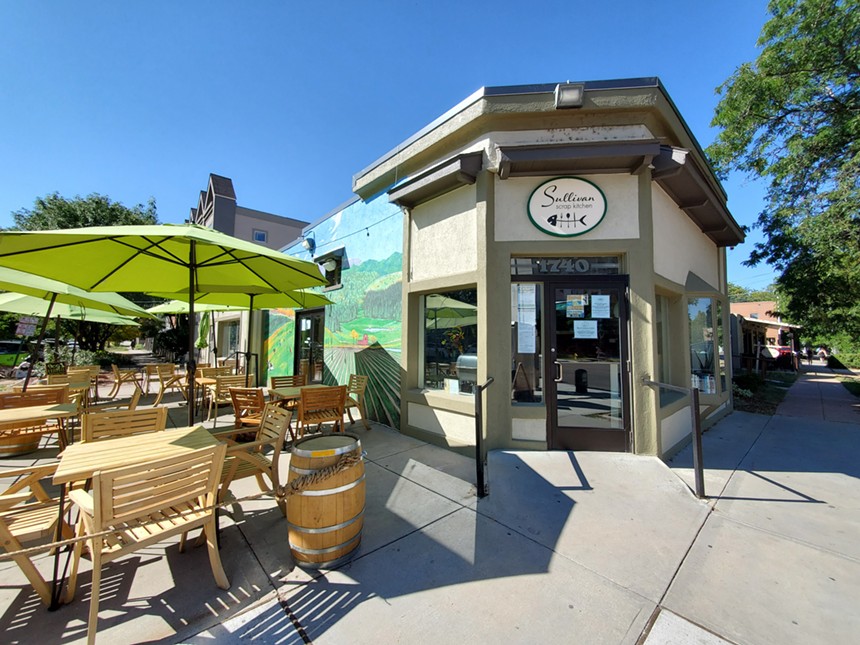After years of being largely ignored by the national media, Denver's restaurant scene is on a roll with at least one major publication: Bon Appétit. For obvious reasons, the magazine skipped its annual "Hot 10" list of the best new restaurants in the country in 2020, instead opting to publish a variety of stories as an ode to restaurants in general.
In 2019, The Wolf's Tailor landed on the magazine's top ten list, while Reunion Bread Co. and Beckon, the tasting menu-style restaurant next door to sibling and 2018 "Hot 10" honoree Call (which is currently closed) both made the top fifty. In 2017, Annette and the Denver Central Market each nabbed a place as one of the fifty finalists. And before that...Denver didn't get much play in the pages of Bon Appétit.
This year, the "Hot 10" has been replaced by a new award: Heads of the Table, which honors "the restaurants, people, and organizations that gave us hope," says the story's introduction. Twelve winners were chosen, including Sullivan Scrap Kitchen, which opened in July 2020 at 1740 East 17th Avenue in the former Bocaza Mexican Grille space (and quickly nabbed our Best Hamburger award in the Best of Denver 2021).
"We really were like totally shocked," says Terence Rogers, who owns the restaurant with his wife, Holly Adinoff, of the Bon Appétit honor. "We were super-happy about it. We couldn't believe it at first."
This is Rogers and Adinoff's first restaurant, and it has a seemingly simple concept: It focuses on sustainability and zero waste, an idea that formed naturally over time.
Rogers, who is originally from the Boston area, got his first restaurant job as a prep cook at a pizza place in Vermont — a gig he took to make extra money while working as a ski resort photographer. "I was awful," Rogers says of his early shifts as a line cook, "but I really enjoyed it."
After moving back to Boston, Rogers got a job on a food truck where the chef mentored him, teaching him new skills including how to make gnocchi — which Adinoff, whom Rogers had recently met, had named as her favorite dish. That gnocchi is one of the reasons they are married today, Adinoff admits.
Eventually, Rogers began doing pop-ups on his own in Boston, which led to catering gigs for private events. In the summer of 2016, he and Adinoff moved to Estes Park for the summer, and they decided to relocate to Denver that fall. Rogers slowly began securing catering jobs again, eventually finding success in that space. But one thing kept bothering him. "It's like, 'What am I going to do with the rest of this piece of bread?'" he explains. "Sure, I could compost it and it won't end up in landfills, and that's great, but it's totally edible."
As the couple searched for a space to use as a commissary for the catering business, potentially with a retail storefront to help offset the cost of buying or leasing, Rogers thought back to lessons he'd learned during an internship at Blue Hill at Stone Barns in New York. "I really saw how they treated a vegetable like how a lot of places would treat a piece of meat," he says, using every part and never discarding any bruised or imperfect produce, instead finding other uses for them. He was also inspired by a restaurant called Relae in Copenhagen and its sister restaurant across the street, Manfreds, which would cross-utilize ingredients.
The concept of Sullivan Scrap Kitchen came together from many pieces, including the 504 loan program through the Small Business Administration that made purchasing, rather than leasing, the restaurant space more affordable, giving Rogers and Adinoff better security as they grow their business.
The percentage of revenue from the catering side of the operation and the restaurant side fluctuates depending on the season, with each supplementing the other. Utilizing the scraps and finding ways to repurpose ingredients allows Rogers to continue to use high-quality local produce and meats while keeping the price point for the menu low. "I think that fits with our mission," Adinoff notes, "because we're sustainable in our food practices but also in our communities. That means local partners, but it also means feeding the people who are close to us."
Rogers and Adinoff aren't quite sure what to expect with this newfound national attention. "We're so honored to be a part of it," Rogers says, "but we just had no idea how things were going to go."
What they do know is that their focus on sustainability will continue to evolve over time. "We realize it's not the end of the road," he explains. "We still have a lot of work to do, and we can always keep improving and getting better, making better food, having better customer experience and really trying to focus on our mission more and more."
Next up: a Palisade wine list, discounts for the teachers and staff at a nearby school, an event with Slow Food, work with the nonprofit Zero Foodprint and more.
"We want to keep finding ways to complement what we're doing," Rogers says.
"And we're always trying to educate people," Adinoff adds.
And so you can expect to hear more about this couple, the latest names to bring deserved attention to this city's restaurant scene.
[
{
"name": "Air - MediumRectangle - Inline Content - Mobile Display Size",
"component": "12017618",
"insertPoint": "2",
"requiredCountToDisplay": "2"
},{
"name": "Editor Picks",
"component": "17242653",
"insertPoint": "4",
"requiredCountToDisplay": "1"
},{
"name": "Inline Links",
"component": "18838239",
"insertPoint": "8th",
"startingPoint": 8,
"requiredCountToDisplay": "7",
"maxInsertions": 25
},{
"name": "Air - MediumRectangle - Combo - Inline Content",
"component": "17261320",
"insertPoint": "8th",
"startingPoint": 8,
"requiredCountToDisplay": "7",
"maxInsertions": 25
},{
"name": "Inline Links",
"component": "18838239",
"insertPoint": "8th",
"startingPoint": 12,
"requiredCountToDisplay": "11",
"maxInsertions": 25
},{
"name": "Air - Leaderboard Tower - Combo - Inline Content",
"component": "17261321",
"insertPoint": "8th",
"startingPoint": 12,
"requiredCountToDisplay": "11",
"maxInsertions": 25
}
]













